Track Smarter. Trade Better.
Turn actionable insights into smarter decisions
Withdraw crypto stress-free
Optimize your crypto taxes before year-end
Wondering how to buy Bitcoin anonymously? With increasingly strict KYC rules, many are looking for safer, more private alternatives for buying Bitcoin. The good news is that there are safe methods for doing so.
In this guide, we’ll take a closer look at the best options for buying $BTC without compromising on safety — namely: no-KYC exchanges, P2P platforms, prepaid cards, and Bitcoin ATMs — we’ll compare their costs, safety, and anonymity levels.
Where to Buy Bitcoin Anonymously — Top 4 Safest Methods Compared
Here are the best ways to buy Bitcoin anonymously in 2026. Note that full anonymity is very difficult to achieve (and for most people, isn't attainable). Each method offers varying levels of anonymity that can be achieved, and each one has its own pros and cons:
<figure class="block-table">
<table>
<tr>
<th>Method</th>
<th>Anonymity Level</th>
<th>Security Rating (1-5)</th>
<th>Pros</th>
<th>Cons</th>
<th>Best For</th>
</tr>
<tr>
<td>No-KYC Exchanges (i.e., Uniswap)</td>
<td>Medium (Pseudonymous; blockchain traceable)</td>
<td>4/5</td>
<td>
— Quick and simple onboarding<br>
— Low fees<br>
— Security by design
</td>
<td>
— Some countries restrict access due to AML regulations<br>
— In the EU, MiCA bans no-ID buys on licensed CASPs, but non-custodial wallets remain viable
</td>
<td>Security and convenience</td>
</tr>
<tr>
<td>P2P Platforms (i.e., Bisq)</td>
<td>High (Direct, cash-friendly) — but pseudonymous</td>
<td>3.5/5 (Escrow helps, but scam-prone)</td>
<td>
— Direct, private transactions on your terms<br>
— Varied payment methods
</td>
<td>
— Costlier than no-KYC exchanges<br>
— Risk of getting scammed/dealing with unreliable sellers
</td>
<td>People who want to pay in local methods/those who don't have access to no-KYC exchanges</td>
</tr>
<tr>
<td>Prepaid Cards (i.e., Visa)</td>
<td>Medium-High (depends on how you use the card, and whether it's loaded with cash)</td>
<td>3.5/5 (No bank links, but card issuer tracking possible)</td>
<td>
— Easy to get and use if available in your country<br>
— Convenient for small and frequent crypto transactions
</td>
<td>
— Limited spending amounts<br>
— Higher transaction fees<br>
— Not universally available
</td>
<td>Small-scale crypto traders who value a high degree of privacy</td>
</tr>
<tr>
<td>Bitcoin ATMs</td>
<td>Low-Medium (Phone/ID often required)</td>
<td>2.5/5 (High scam/fraud risk)</td>
<td>
— No need for online registration<br>
— Quick and convenient
</td>
<td>
— High fees and withdrawal limits<br>
— Availability varies by region<br>
— Risk of getting scammed
</td>
<td>Buying $BTC via small cash transactions</td>
</tr>
</table>
</figure>
Why Buy Bitcoin Without an ID?
Many investors prefer to buy $BTC without providing an ID, as the crypto industry is inherently high-risk due to its vulnerability to hacks and scams. But there are other reasons why people prefer anonymous crypto purchases—here's a quick overview of the main ones:
- Privacy protection — Investors want protection from surveillance, essentially to avoid sharing their personal data with third parties, such as banks and governments. This is becoming increasingly difficult to prevent.
- Risks of data breach — Centralized exchanges (CEXs) can be vulnerable to hacks or leaks. Using decentralized exchanges (DEXs) reduces that risk, as users keep funds in their own wallets.
- Regulatory issues — Some jurisdictions have murky crypto regulations (Russia and India are but two examples), and buying $BTC anonymously helps investors access digital assets safely.
- Financial independence — Banks are uneasy about crypto and are tightening their requirements. Anonymous transactions mean that investors don’t have to rely on financial institutions and authorities to approve their transactions if they don’t wish to.
Since major banks may refuse to work with you if they believe your earnings are from cryptocurrency, no-KYC purchases are becoming increasingly worthwhile to consider, but also more complex to achieve due to the increased scrutiny worldwide on all things crypto.
The Cons of Buying Bitcoin Anonymously
While privacy and financial independence are big reasons to consider buying Bitcoin anonymously, there are real trade-offs. Here are some of the main drawbacks of purchasing $BTC with no KYC:
- Increased fees — No-KYC exchanges and Bitcoin ATMs, for example, often come with premium rates.
- Scam risks — Unregulated exchanges and P2P platforms have few ways to be kept accountable, so you’re not protected against the possibility of scams and fraud.
- Limited purchase amounts — Several methods for buying $BTC anonymously have a cap on the amount you can buy for AML purposes.
- Low liquidity — A lot of smaller, privacy-focused platforms that allow no-KYC purchases may not have the trading volume of major CEXs.
- No recovery options — Should something go wrong, it’s almost impossible to recover lost or stolen crypto without a verified account.
- Freeze risk — Transferring anonymous $BTC to KYC-required exchanges (such as Binance) can lead to account freezes under AML rules.
➡️Related Read:
Can You Actually Buy Bitcoin With No KYC?
Yes, it's possible, but it's not a straightforward process due to widespread AML and KYC regulations being put in place globally to monitor crypto activity (i.e., the FATF Travel Rule):
- What is AML (Anti-Money Laundering)? — This refers to the laws and regulations that prevent people from turning unlawfully obtained cryptocurrency into cash.
- What about KYC (Know Your Customer)? — This is part of the AML procedures; it's the verification process that platforms (such as CEXs) use to collect your personal details, like your ID, to ensure compliance with financial regulations.
Many of the biggest crypto platforms today, including Binance, for example, have rigorous AML and KYC procedures in place to prevent fraud and other illegal activities, which ultimately impact your privacy.
As regulators in major countries, such as the US (i.e., FinCEN), seek to eliminate no-KYC entirely, regulatory changes like this could, unfortunately, render your attempts at anonymity worthless in the future.
Understanding the Different Levels of Anonymity
As we've established, buying Bitcoin anonymously isn't as clear-cut as that — there are several levels (or a spectrum) of anonymity depending on the method(s) used.
- KYC — You’d get the least privacy by using exchanges that require KYC or when reusing addresses (this lets anyone cluster your activity and infer ownership). Even if you bought anonymously, doing this links all future spending to a single identity.
- High anonymity — Using a non-custodial wallet (Best Wallet, for instance) and a no-KYC exchange can offer a high degree of privacy, as you can trade without providing an ID. However, the traces of wallet addresses and transactions are still recorded as blockchains are pseudonymous by design.
- Full anonymity — While this is still possible in some regions, it takes a lot of effort and generally requires using a mix of (higher risk) methods such as mixers and illegal ATMs. We do not condone or recommend doing this.
A non-custodial wallet and using a no-KYC exchange are among the safest methods for high anonymity. However, it is worth repeating that since every transaction’s address is recorded on a public ledger, transactions can be connected, and patterns can be traced.
Bitcoin is pseudonymous, not fully anonymous.
Is Absolute Anonymity Possible?
While you can buy $BTC without KYC, buying $BTC with full anonymity is impossible for most users. To achieve it, you’d have to control every aspect of the transaction that can link to you. That means:
- Masking your IP with a VPN,
- Using a secure and isolated device,
- Avoiding any exchanges requiring KYC, and
- Ensuring the transaction doesn’t reveal anything about you and can’t be matched to any of your previous transactions.
Those who attempt to attain complete anonymity typically consider tools like mixers (such as CoinJoin) and privacy coins, but both are currently facing serious legal scrutiny and are banned in certain regions.
All things considered, it's worth noting that even if you manage to achieve all of the above, there’s still no guarantee of full anonymity.
Legal & Tax Considerations of No-KYC Purchases
As Bitcoin transactions are visible on the public blockchain, this means that even if your chosen method of $BTC purchase doesn’t require KYC, you’re not immune from legal and tax implications of your transactions.
These depend on the jurisdiction you’re in, and ignorance of tax laws risks penalties. We strongly advise that you ensure you're familiar with the applicable regulations of your country.
For instance, in the EU, the new MiCA (Markets in Crypto-Assets) Regulation has effectively ended anonymous cryptocurrency transactions, even for small amounts. It did so by making KYC mandatory for crypto-asset service providers (CASPs).
That means it’s now almost impossible to buy $BTC anonymously in the EU using legitimate methods, such as exchanges.
And while the US doesn’t yet have a MiCA equivalent, it has institutions like the IRS and the SEC, which impose their own requirements. For instance, the IRS classifies crypto as property, and the income derived from it is taxable. US-based CASPs must report user data.
Best Places to Buy Bitcoin Anonymously in 2026 Explained
So, we've established that there are several methods for buying Bitcoin anonymously in 2026, each with varying safety and privacy considerations.
Below, we’ll explore each one in more detail to help you choose the one that suits your needs and comfort level.
No-KYC Platforms
We consider no-KYC crypto exchanges to be one of the safest methods for buying $BTC anonymously in 2026 (Uniswap and Pancakeswap are among the most popular).
Some non-custodial wallets, like Best Wallet, also offer an integrated DEX (that doesn't require ID from users who want to trade cryptocurrency), and offer top-level security, with multilayer encryption.
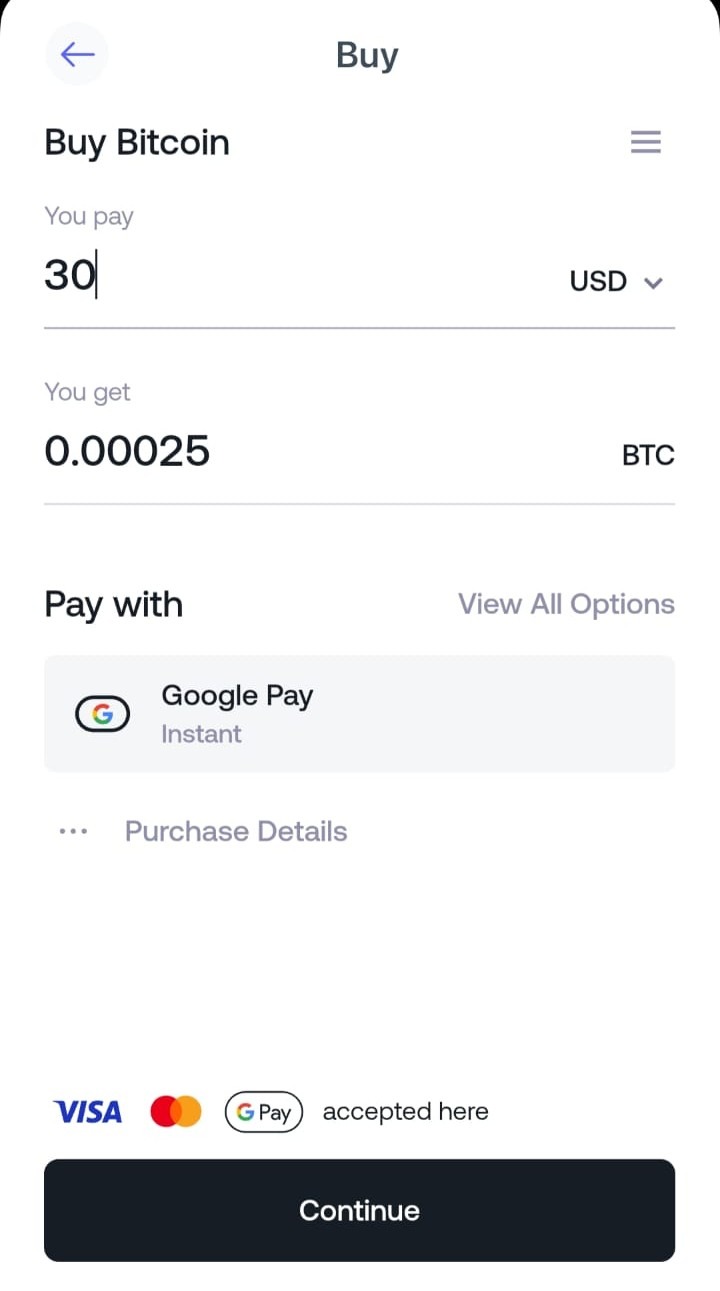
However, Best Wallet has an optional 2FA through email/text. This is worth noting as it can offer information about you, potentially undermining your anonymity. So, keep that in mind.
Best Wallet also offers various payment methods for Bitcoin, including crypto, PayPal, Apple/Google Pay, and credit cards, making it easier for you to control how much financial data you want to share.
Exchanges are typically easy to use and offer lower fees compared to P2P networks or Bitcoin ATMs. However, it’s worth noting that they’re not available in every jurisdiction.
Moreover, as we elaborated above, no-KYC doesn’t guarantee that your transactions can't be linked back to you if patterns are detected.
Pros of No-KYC Exchanges
- No ID required
- Quick and simple onboarding
- Low fees
- Security by design
Cons of No-KYC Exchanges
- Some countries restrict access due to AML regulations
P2P Platforms
Peer-to-peer (P2P) trading platforms are exchanges that connect crypto buyers and sellers directly. These allow you to buy $BTC anonymously and directly, without the need for intermediaries.
That said, it's worth noting that there are KYC P2P platforms (e.g., Binance) and no-KYC P2P platforms, such as Bisq — the latter is relatively rare nowadays, primarily due to regulations.
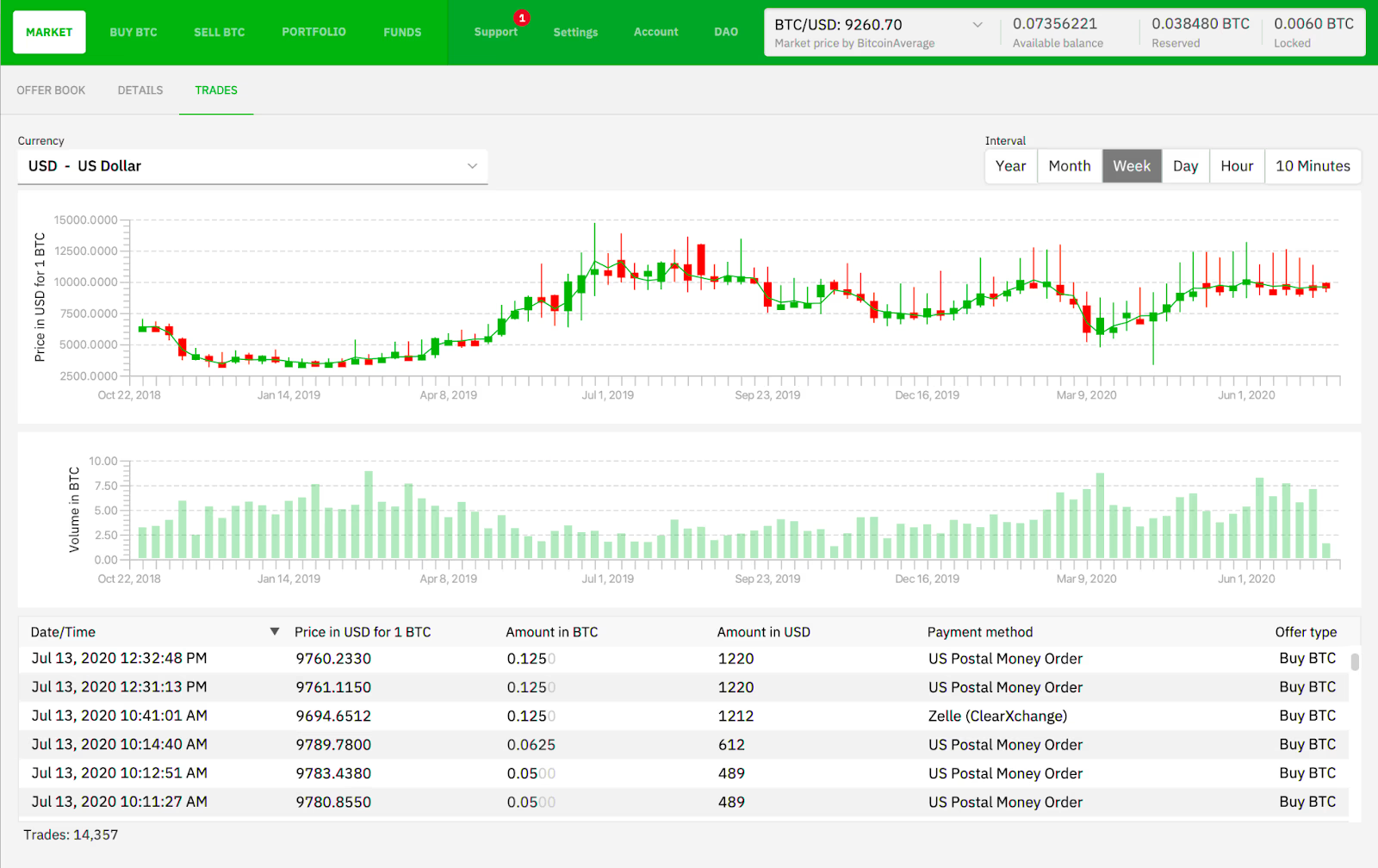
Usually, you can choose your own payment method between yourselves as well, such as cash, credit card, or even a gift card, ensuring that you’re as anonymous as you want to be in this respect.
However, that also means you’re more vulnerable to scams and fraud, as P2P exchanges like OKX and Binance generally aren't liable for any lost or stolen cryptocurrency.
The fees you pay also vary greatly depending on the seller, and can be much higher than what you'd find on no-KYC exchanges.
Pros of P2P Platforms
- Direct, private transactions on your terms
- Varied payment methods
- Escrow systems improve the safety aspect
Cons of P2P Platforms
- Risk of getting scammed or dealing with an unreliable seller
- More expensive than no-KYC exchanges.
- No-KYC P2P platforms are hard to come by nowadays
Prepaid Cards
Some organizations offer prepaid debit cards, such as Visa and Mastercard, that allow you to buy $BTC without revealing personal information. You'd load them with cash or crypto and then use them to buy $BTC.
These cards don’t come with a bank account, so they’re exempt from the KYC regulations and credit checks that financial institutions are required to follow.
However, they often come with spending limits and high transaction fees. Moreover, their availability varies worldwide.
It's also worth mentioning that the anonymity level here would also depend on what you do afterwards. For example, if you head to Binance, follow the KYC process, and then pay with a prepaid card, it renders your efforts to maintain anonymity useless.
Pros of Prepaid Cards
- Easy to obtain and use if available in your country
- No links to a personal bank account
- Convenient for small and frequent crypto transactions
Cons of Prepaid Cards
- Limited spending amounts
- Higher transaction fees
Bitcoin ATMs
Some countries have Bitcoin ATMs, also known as cash machines. These let you buy $BTC anonymously using cash.
As you can see in the illustration below, most Bitcoin ATMs are located in the US, but there are plenty situated in other countries.
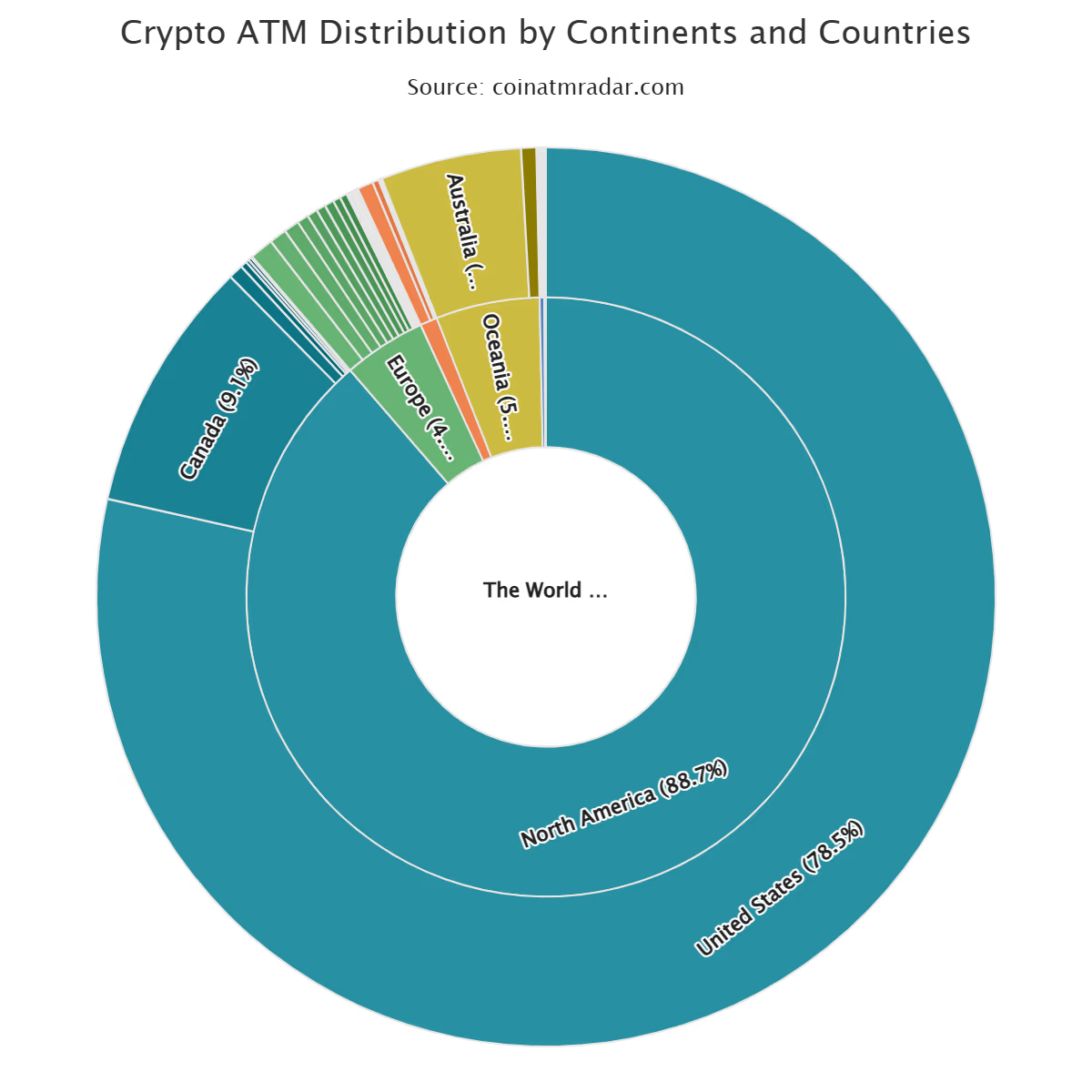
Although ATMs appear to be a convenient method for buying $BTC anonymously, true anonymity is almost impossible with them in 2026.
Nearly all legitimate ATMs have some level of KYC embedded within, like asking for your phone number. If they don’t, they’re likely illegal or unregistered.
This is important to note, as crypto ATM scams and instances of fraud are very prevalent. In fact, in 2023 alone, US consumers lost over $110M to them. So, be careful and DYOR when deciding to use a Bitcoin ATM.
Moreover, these ATMs often limit the amount of crypto you can withdraw and charge high fees — we're talking up to 20% per transaction.
For these reasons, we only recommend $BTC ATMs as a last-resort option for small-scale withdrawals.
Pros of Bitcoin ATMs
- Quick and convenient
- There's no need for online registration
Cons of Bitcoin ATMs
- High fees and withdrawal limits
- Availability varies by region
- High risks of scams
How to Buy $BTC Anonymously - Step-by-Step Guide
While there are several methods you could use, we'll go over the easiest one: buying cryptocurrencies like $BTC anonymously through an app like Best Wallet.
Here’s a detailed guide on how you can do just that.
1. Download Best Wallet on Your Mobile Device
Go to the official Best Wallet website and click ‘Download Best Wallet.’ Then scan the QR code on the screen with your phone.
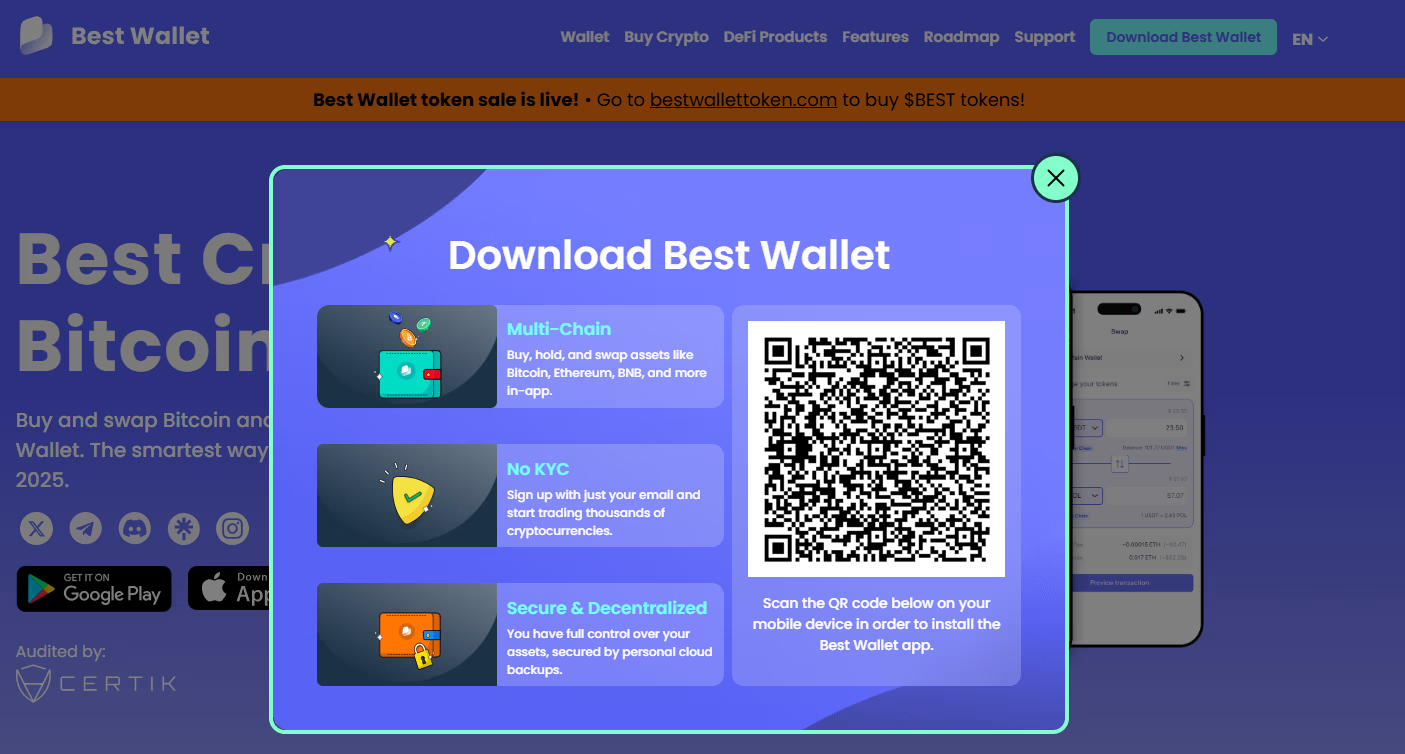
2. Set Up Your Wallet
Follow the prompts in the app to set up your account. All you need is an email and a password to lock your account.
If you’re looking to be as anonymous as possible, don’t provide an email that clearly states who you are.
3. Top Up Your Wallet
Once you’re set up, send some funds to the wallet. Make sure you have enough for the amount of $BTC you want to buy and for any network fees.
You can buy as little as $0.000001 BTC.
4. Buy $BTC
Go to your Best Wallet dashboard, tap ‘Buy’ and choose Bitcoin ($BTC). Choose your network (BTC or WBTC on Ethereum) and your payment method.
Buying $BTC with a credit card can reduce the anonymity of the transaction. To increase anonymity, consider using cash at a P2P exchange. After that, you can immediately withdraw $BTC to Best Wallet. You can also use a prepaid card on Best Wallet directly.
After that, simply confirm the transaction in the app.
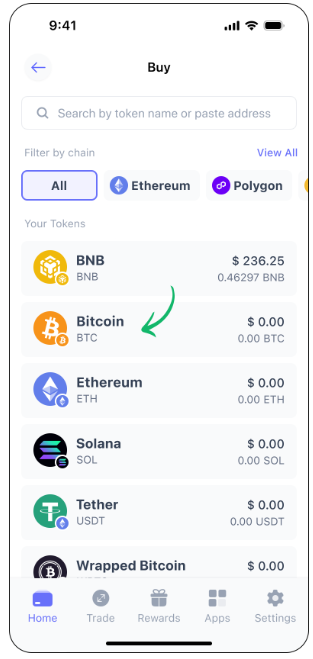
Your $BTC is now in your Best Wallet account. You can store it there, or you can sell, trade, or swap it.
Common Mistakes in Buying $BTC Without ID
Even if you purchase Bitcoin anonymously, there are a few common pitfalls that can expose your identity. Here are some of the most common mistakes in buying $BTC without an ID:
- Using a CEX after buying anonymously — Transferring anonymously purchased $BTC into an exchange that requires KYC immediately links the crypto to you. It would be better to keep it in a non-custodial wallet like Best Wallet that integrates with no-KYC DEXs.
- Paying with non-anonymized methods — Using PayPal or bank transfers leaves a clear trail straight to you. It’s safer to pay with cash or prepaid cards.
- Reusing wallet addresses — All $BTC addresses are stored on the blockchain, so if you reuse them, it’ll be easy to connect multiple transactions to a single user.
- Not using VPNs — Your IP address can reveal your location, so many after anonymity use a reliable virtual private network (VPN) when executing crypto transactions (if legal in your country).
- Falling for scams — There are several services out there that claim to offer anonymous $BTC sales but actually steal funds or personal details. Always do your own research (DYOR) before buying $BTC - regardless of the method you choose.
Concluding Our Guide on How to Buy Bitcoin Anonymously
In 2026, buying $BTC with a high degree of anonymity, without KYC, is achievable; however, completely anonymous Bitcoin purchases are very difficult (and risky) to achieve.
We’ve explored the most popular methods, including no-KYC exchanges, P2P platforms, prepaid cards, and crypto ATMs, each with varying benefits, risks, and levels of anonymity.
Among them, the no-KYC exchange and platforms that support buying, selling, and swapping without KYC (like Best Wallet) stand out as the most secure, accessible, and efficient option for anonymously buying $BTC.
Regardless, anyone seeking high (or full) anonymity should carefully consider their options and weigh the pros and cons of each one. Always do your own research before buying — this is not financial or investment advice.
FAQs
1. Can Bitcoin be bought anonymously?
Yes, but while high anonymity is possible, complete anonymity is very difficult (and near impossible, not to mention very risky, for most people) to attain.
Popular options for buying Bitcoin anonymously include no-KYC exchanges (medium anonymity level, as blockchains are pseudonymous), P2P platforms (high anonymity, but also pseudonymous), prepaid cards (medium-high anonymity — high, if the card is loaded with cash), and Bitcoin ATMs (low-medium anonymity, as most legitimate ATMs require an email/ID).
The safest method is to use a privacy-focused wallet with an integrated DEX like Best Wallet — see our ‘Best Places to Buy Bitcoin Anonymously in 2026 Explained’ for more information.
2. Can buying Bitcoin be traced?
Yes, as every $BTC transaction is stored on the blockchain, it can be traced. Wallet addresses can often be linked to real identities if you keep re-using them. See our ‘Common Mistakes in Buying $BTC Without ID’ for more details.
3. Can I buy Bitcoin without SSN?
Yes, you can buy $BTC without providing your Social Security Number (SSN) or its equivalent in your country. You can do so by using the no-KYC exchanges, P2P platforms, Bitcoin ATMs, or prepaid cards.
4. What Bitcoin wallet does not require ID?
Best Wallet doesn’t require your ID for KYC verification when buying $BTC. It offers a private and secure alternative to CEXs. See our section on 'How to Buy $BTC Anonymously' to find out more.
















